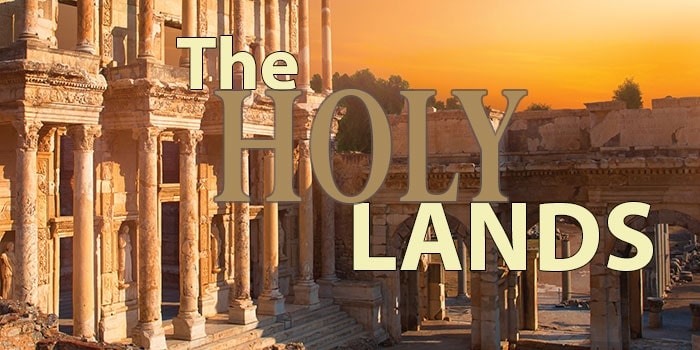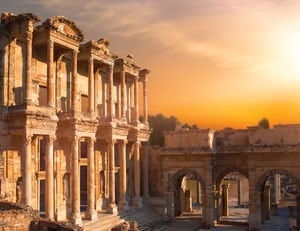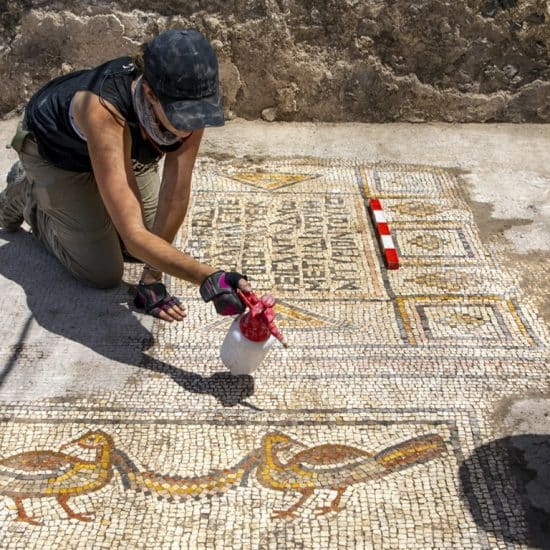
Nearly 700,000 tourists from the United States travel each year to Israel, making the U.S. the top country of origin and accounting for about one-sixth of Israel’s tourists. For many — if not most — of the tourists, the trip is a kind of religious pilgrimage to the “holy land.” Yet the lands of the Bible actually stretch across several modern nations, including Egypt, Jordan, Iraq, Syria, Lebanon, Turkey, Greece, and Italy. Jordan, which includes many biblical holy sites, sees less than 200,000 U.S. tourists every year — with many of them popping in for only a day or tour as an “extension” from a one- or two-week stay across the river in Israel. The number of U.S. tourists visiting Lebanon barely tops 100,000 a year — and war-torn countries like Syria and Iraq obviously see almost none.
 Jim Hill, executive director of Churchnet, has traveled to about 40 countries and leads tours to biblical lands with two of his brothers, pastors Pete and Drew. Hill said Israel “is obviously a special place for a Christian pilgrimage,” but added that his “next two favorite countries are Turkey and Jordan.” He said traveling to these countries impacts the way he reads scriptures.
Jim Hill, executive director of Churchnet, has traveled to about 40 countries and leads tours to biblical lands with two of his brothers, pastors Pete and Drew. Hill said Israel “is obviously a special place for a Christian pilgrimage,” but added that his “next two favorite countries are Turkey and Jordan.” He said traveling to these countries impacts the way he reads scriptures.
“After many trips to these places, I read the biblical stories with an entirely different perspective and I see the world around me in a whole new way,” he explained. “I look forward to each trip and I always have new experiences, see new discoveries and meet God in new and fresh ways.”
Hill called Ephesus — in modern Turkey — “an experience all by itself” and “one of my favorite places in the world.” He explained that since an earthquake destroyed the city in the third century and covered it with mud and debris, it provides “a rare opportunity to visit the excavations of an ancient city where no modern city has been built over it.” A massive city, it served as the Roman capital for Asia Minor and was home to a 25,000-seat amphitheater and a library with 12,000 scrolls.
“Ephesus was one of the seven churches of Asia that are cited in the Book of Revelation,” Hill added. “Some believe the Gospel of John may have been written in Ephesus and the city was the site of several early Christian councils. The other sites of the seven churches are not far from this incredible city. In many respects the Apostle Paul, a native of Tarsus, brought the gospel back to Galatia and planted churches throughout Asia Minor and Greece. There is wonderful biblical and early Christian history throughout the country of Turkey.”
Hill also enjoys taking groups to Jordan. Among popular stops are some of the cities of the Decapolis — like Jerash and Amman — and Petra, which long before being popularized in “Indiana Jones and the Last Crusade” was home to the Nabataean kingdom in which Herod’s the Great’s wife was a princess.
“Many people are unaware of how much biblical history finds its roots in Jordan,” he noted. “Traveling through the land of Edom, Moab and Amman on the ancient King’s Highway allows you to revisit the stories of the Old Testament with an entirely new perspective as you place the narrative in the geographical context.”
“I remember a very moving day in Jordan standing on the top of Mount Nebo reading from the Book of Deuteronomy where Moses ascended to view the land of Israel,” Hill added. “On a clear day, you can almost view the entire land of Israel. Tradition says Moses was buried in an unknown valley location in Moab. In Jordan, as in Israel and Turkey, it seems wherever you step or drive you come upon biblical history.”
Power of History
Other countries in the region are also ripe with biblical history. The Bible mentions Lebanon more than 70 times, particularly focusing on its cedar trees — such as the ones King Solomon used in the temple. In what is now Lebanon, Elijah raised to life the son of a widow, Jesus healed the demon-possessed daughter of a Canaanite woman and more. Paul met Jesus on the road to Damascus in Syria, a nation that fought Israel in the Old Testament and included many people healed by Jesus. Iraq includes many biblical places, including Babel, Abram’s home of Ur, Rebekah’s home, where Jacob met Leah and Rachel, Nineveh and the land of the Babylonians where Daniel, Shadrach, Meshach and Abednego lived in exile.
These historical sites can provide legitimacy to Christian and Jewish communities today as they can point to their faiths’ long culture in the land. This explains part of the terrorism strategy of ISIS — destroying cultural and religious sites. Using bulldozers and explosives, ISIS militants have destroyed a site said to be the tomb of Jonah near Nineveh, multiple ancient Christian churches and monasteries and many other ancient sites.
Recognizing the power of cultural history, the Baptist World Alliance held its 2014 meeting in Izmir, Turkey. Known in biblical times as “Smyrna,” another of the seven cities in Revelation.
A Baptist pastor in Turkey invited global Baptists to come in hopes that Turkish leaders would see the tourism value of proclaiming — not trying to erase — the Christian heritage in the nation. It also provides legitimacy to the local community of believers to be viewed as part of a global movement. The Alliance of Baptist Churches in Turkey includes only four churches and the pastors have suffered political, legal and other forms of persecution. The BWA meeting brought several Turkish dignitaries — including the nation’s tourism minister — to meet global and Turkish Baptist leaders.
Then-BWA President John Upton, executive director of the Baptist General Association of Virginia, said he was “excited” to visit Turkey since it is “the cradle of the Christian movement.” He added that all the biblical history in the land means that, for Christians, traveling to Turkey is “almost like being back home.”

